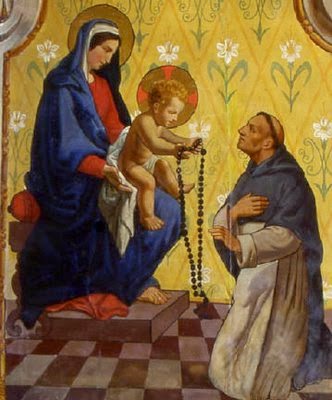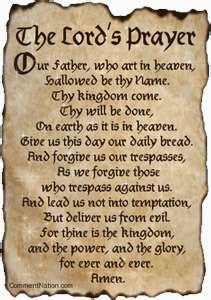The surpassing merit of the holy Rosary as a meditation of
the life and passion of our Lord Jesus Christ
By St. Louis de Montfort
A mystery is a sacred thing which is difficult to
understand.
The works of our Lord Jesus
Christ are all sacred and divine because he is God and man at one and the same
time. The works of the Blessed Virgin
are very holy because she is the most perfect and the most pure of God’s
creatures.
The works of our Lord and of
his blessed Mother can rightly be called mysteries because they are so full of
wonders, of all kinds of perfections, and of deep and sublime truths, which the
Holy Ghost reveals to the humble and simple souls who honour these
mysteries.
 |
| Our Lady of the Roses |
St. Dominic divided the lives of our Lord and our Lady into
fifteen mysteries, (St. John Paul II added the Luminious Mysteries in the Year
of the Rosary 2002-2003), which stand for their virtues and their most
important actions.
These are fifteen
pictures whose every detail must rule and inspire our lives. They are fifteen flaming torches to guide our
steps throughout this earthly life; fifteen shining mirrors to help us to know
Jesus and Mary, to know ourselves and to light the fire of their love in our
hearts; fifteen fiery furnaces to consume us completely in their heavenly
flames.
Our Lady taught St. Dominic this
excellent method of praying and ordered him to preach it far and wide so as to
reawaken the fervour of Christians and to revive in their hearts a love for our
Blessed Lord.
She also taught it to
Blessed Alan de la Roche and said to him in a vision, “When people say 150
Hail Marys, that prayer is very helpful to them and a most pleasing tribute to
me. But they will do better still and
will please me more if they say these salutations while meditating on the life,
death, and passion of Jesus Christ, for this meditation is te soul of this
prayer.”
For the Rosary said without
meditation on the sacred mysteries of our salvation would be almost be a body
without a soul, excellent matter, but without the form, which is the
meditation, and which distinguishes it from other devotions.
The first part of the Rosary contains five mysteries: the
first, the Annunciation of the archangel Gabriel to our Lady; the second the
Visitation of our Lady to Saint Elizabeth; the third, the Nativity of Jesus
Christ; the fourth, the Presentation of the Child Jesus in the Temple and the
purification of the Blessed Virgin; the fifth, the Finding of Jesus in the
Temple among the doctors. These are called
the Joyful Mysteries because of the joy which they gave to the whole
universe. Our Lady and the angels were
overwhelmed with joy the moment the Son of God became incarnate. Saint Elizabeth and St. John the Baptist were
filled with joy by the visit of Jesus and Mary.
Heaven and earth rejoiced at the birth of the Saviour. Holy Simeon felt great consolation and was
filled with joy when he took the holy child into his arms. The doctors were lost in admiration and
wonderment at the replies which Jesus gave; and who could express the joy of
Mary and Joseph when they found Jesus after three days’ absence?
The second part of the Rosary is also composed of five
mysteries, which are called the Sorrowful Mysteries because they show us our
Lord weighed down with sadness, covered with wounds, laden with insults,
sufferings and torments. The first of
these mysteries is our Lord’s prayer and his Agony in the Garden of Olives; the
second, his Scourging; the third, his being Crowned with thorns; the fourth,
his Carrying of the Cross; the fifth, his Crucifixion and death on Calvary.
The third part of the Rosary contains five more mysteries,
which are called the Glorious Mysteries, because when we say them we meditate
on Jesus and Mary in their triumph and glory.
The first is the Resurrection of Jesus; the second, his Ascension into
heaven; the third, the Descent of the Holy Ghost upon the apostles; the fourth,
our Lady’s Assumption in glory; the fifth, her Coronation. Such are the fifteen fragrant flowers of the
mystical Rose-tree, on which devout souls linger, like discerning bees, to
gather their nectar and make the honey of a solid devotion.
Read the words of St. John Paul II regarding the Holy Rosary
http://www.vatican.va/holy_father/john_paul_ii/apost_letters/documents/hf_jp-ii_apl_20021016_rosarium-virginis-mariae_en.html


















.jpg)
.jpg)




.jpg)




